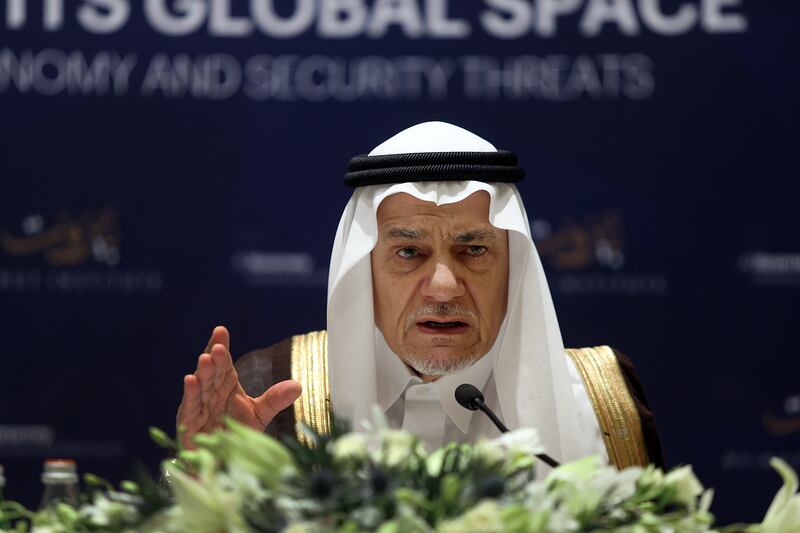Saudi Arabia's Prince Turki Al Faisal, who previously served as the kingdom’s ambassador to the US, publicly questioned President Joe Biden’s commitment to the Gulf states on Tuesday, which led to a soft rebuttal from the State Department’s number two diplomat for the Middle East.
Prince Turki, who currently serves as the head of the King Faisal Centre for Research and Islamic Studies, cited Mr Biden’s withdrawal from Afghanistan during remarks at the Atlantic Council and warned him against taking steps that would scale back US relations with the Gulf Co-operation Council.
“The US-GCC countries’ relationship is imperative to peace and stability in the region,” Prince Turki said.
“I call on Mr Biden to weigh carefully any steps he takes that impact this historical bond and rather build on it to have a new security structure for the region.”
Joey Hood, the deputy assistant secretary of state for Near Eastern affairs, delivered remarks immediately after Prince Turki, highlighting the Biden administration’s continued support of its Gulf security partners while calling for a more “expansive view” of what qualifies as a threat.
“I must emphasise, simply because there’s been so much disinformation about it recently, that our security partnerships will endure,” Mr Hood said.
“We’ve had a regular military presence in the region for over 70 years. And that fundamental reality will not change.
“As the threats and conditions change, we adapt. So, we have small numbers of capable forces throughout the region now training and advising our partners to become more capable and self-sufficient.”
Mr Biden said in February that he was ending US support for offensive Saudi operations against Yemen’s Houthi rebels.
This included the suspension of a major arms sale to Saudi Arabia, negotiated under former president Donald Trump, which involved precision-guided munitions.
And while Mr Biden has begun to remove US troops and anti-missile batteries that Mr Trump had stationed in Saudi Arabia, he has also pledged to continue supporting the Saudi military's defensive operations.
Prince Turki did not mention the Biden administration’s scaled-back military support for the kingdom but instead highlighted the chaotic US withdrawal from Afghanistan and heightened tension between American troops and Iran-backed militias in Iraq.
“This failed experience in Afghanistan and the other, I would say, semi-failed experience in Iraq are responsible for the perceived failure or defeat … of a great power, the United States, and the greatest military alliance, Nato, in sustaining a regime and project of their creation,” he said.
“Allies and friends of the United States, and the west in general, will be rethinking and reconsidering their future away from the western-dominant paradigm that dominated the geopolitics of the region during the last few decades.”
Mr Hood criticised China in his remarks, particularly in regards to civil liberties, and also stressed the need to strengthen state institutions and improve governance throughout the region.
“Countries can’t defeat Covid-19 or [ISIS] if they’re too weak, unstable and inward-looking due to their failures to build legitimate institutions capable of delivering the good and effective governance that people demand," Mr Hood said.
“Nor will they be prepared to tackle the very real and imminent threats posed by climate change."
Prince Turki’s and Mr Hood’s remarks came after Mr Biden’s Iran envoy, Robert Malley, returned from a visit to the Gulf last week that included stops in Saudi Arabia and the UAE.
Much of Mr Malley’s trip centred on discussing contingency plans with US security partners should the US and Iran fail to come to an agreement that would revive the nuclear deal.
Mr Malley told reporters last week that the Gulf states he visited indicated they would be open to deepening economic ties with Iran if US sanctions were lifted under a revived nuclear deal.
However, he also hinted that the US would continue to pursue nuclear diplomacy with Iran even if Tehran makes technological advancements to the point where the current deal unravels.







